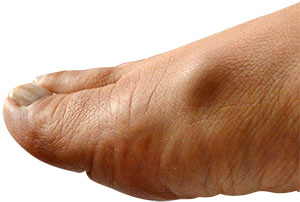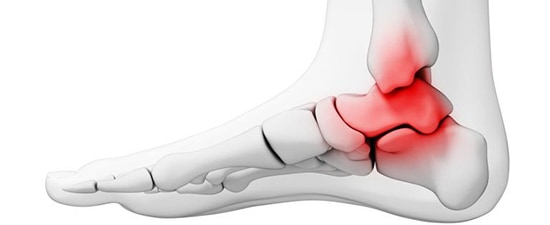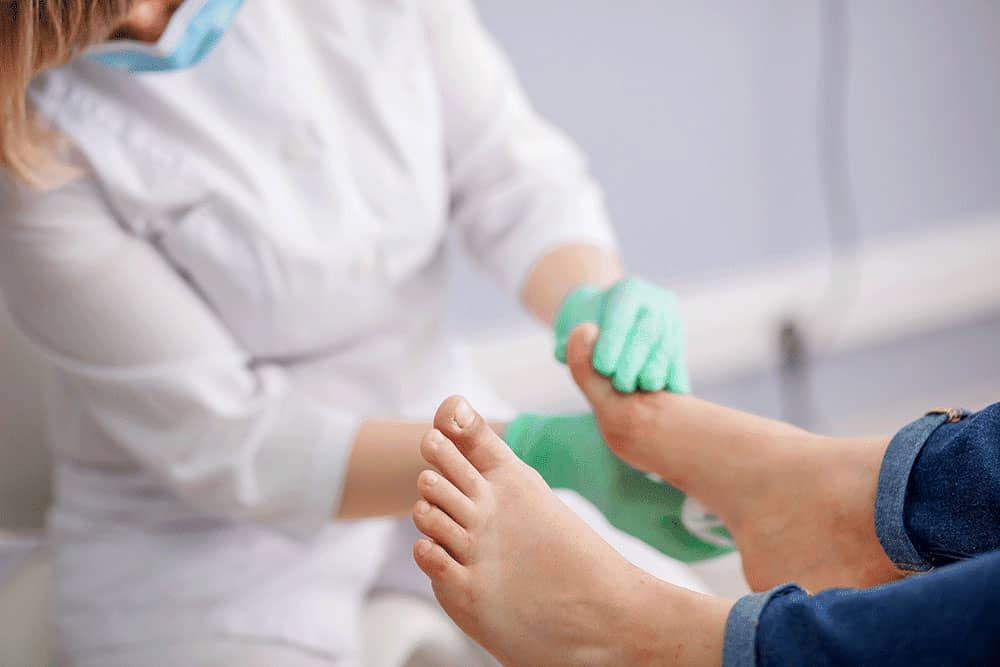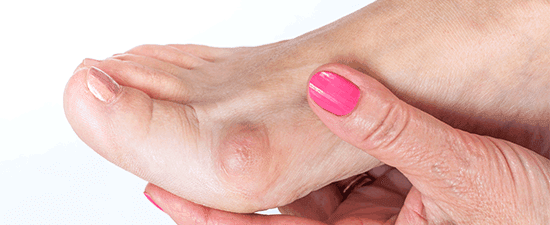- Home
- Foot & Ankle Conditions
- Cysts
- Synovial Cysts
Synovial Cysts: symptoms, causes and treatments
- Published 11/1/2017
- Last Reviewed 6/11/2024

What is a synovial cyst on the foot?
A cyst is a pouch or fluid-filled sac under the skin. Synovial cysts generally occur on the top of the foot. A synovial cyst forms when jelly-like fluid leaks from a nearby joint. Although they're known medically as soft tissue tumors, synovial cysts are not cancerous and are easily treated.
Synovial fluid lubricates the facet joints and helps them move smoothly. A channel between the cyst and joint capsule, tendon sheaths, bursae, and ligaments allows fluid to move freely between the structures.
- What are synovial cyst risk factors?
- What is synovial cyst foot treatment?
- Are there non-surgical treatment options for a synovial cyst?
- Surgical treatment options for a synovial cyst
- University Foot and Ankle Institute is the best choice for synovial cyst treatment
- Synovial cyst FAQs
- Can synovial cysts occur in other parts of your body besides the foot?
- How serious is a synovial cyst?
- What is the difference between a ganglion cyst and a synovial cyst?
- Can a synovial cyst go away on its own?
- Is a synovial cyst cancer?
-
Dr. Gina Nalbandian specializes in reconstructive and revisional foot and ankle surgery, foot and ankle trauma, sports medicine, lapiplasty, and limb salvage.
While an undergrad, Gina volunteered at free clinics, hospitals and with the AIDS Project in Los Angeles, all the while exploring various careers in medicine. She also conducted and published her research in the lab on campus. “I soon found out that the lab life wasn’t for me, and I wanted a more hands-on approach to medicine,” she says.
Dr. Nalbandian did her residency at St. Elizabeth’s Medical Center in Boston, which is affiliated with Tufts University. As a resident, she served an academic coordinator and chief resident.
A resident of Sherman Oaks, Gina continues to volunteer her expertise with the Special Olympics, Happy Feet (providing foot care at homeless shelters), and the Boston Marathon.
Read Our Blog Articles About Cysts and Warts
 Very friendly staff and doctor.. Excellent communication. Very happy with my experience!Tom V.
Very friendly staff and doctor.. Excellent communication. Very happy with my experience!Tom V. I liked it.Liisa L.
I liked it.Liisa L. I depend on the doctors at UFAI to provide cutting edge treatments. Twice, I have traveled from Tucson, Arizona to get the car...Jean S.
I depend on the doctors at UFAI to provide cutting edge treatments. Twice, I have traveled from Tucson, Arizona to get the car...Jean S. I had surgery on my small toe on my right foot. After surgery I had absolutely no pain. I was impressed with the skill of Dr ...Betsy H.
I had surgery on my small toe on my right foot. After surgery I had absolutely no pain. I was impressed with the skill of Dr ...Betsy H. They helped me in an emergency situation. Will go in for consultation with a Dr H????
They helped me in an emergency situation. Will go in for consultation with a Dr H????
Re foot durgeryYvonne S. You guys are miracle workers. Other podiatrists had "treated" my plantar fasciitis by simply giving me custom insoles and telli...Rigo G.
You guys are miracle workers. Other podiatrists had "treated" my plantar fasciitis by simply giving me custom insoles and telli...Rigo G. It went very smoothly.Maria S.
It went very smoothly.Maria S. My experience at the clinic was wonderful. Everybody was super nice and basically on time. Love Dr. Bavarian and also love the ...Lynn B.
My experience at the clinic was wonderful. Everybody was super nice and basically on time. Love Dr. Bavarian and also love the ...Lynn B. I fill I got the best service there is thank youJames G.
I fill I got the best service there is thank youJames G. My experience with your practice far exceeded any of my expectations! The staff was always friendly, positive and informative. ...Christy M.
My experience with your practice far exceeded any of my expectations! The staff was always friendly, positive and informative. ...Christy M. Love Dr. Johnson.Emily C.
Love Dr. Johnson.Emily C. I am a new patient and felt very comfortable from the moment I arrived to the end of my visit/appointment.Timothy L.
I am a new patient and felt very comfortable from the moment I arrived to the end of my visit/appointment.Timothy L.
-
 Listen Now
Expert Insights On Treatment Options For Cystic Lesions Of The Talus
Read More
Listen Now
Expert Insights On Treatment Options For Cystic Lesions Of The Talus
Read More
-
 Listen Now
What is Synovial Sarcoma? A Rare and Dangerous Cancer
Read More
Listen Now
What is Synovial Sarcoma? A Rare and Dangerous Cancer
Read More
-
 This foot condition is the new back pain — it’s everywhere. UFAI in the News.
Read More
This foot condition is the new back pain — it’s everywhere. UFAI in the News.
Read More
-
 Listen Now
11 Common Foot Lumps and Bumps and What To Do About Them
Read More
Listen Now
11 Common Foot Lumps and Bumps and What To Do About Them
Read More




